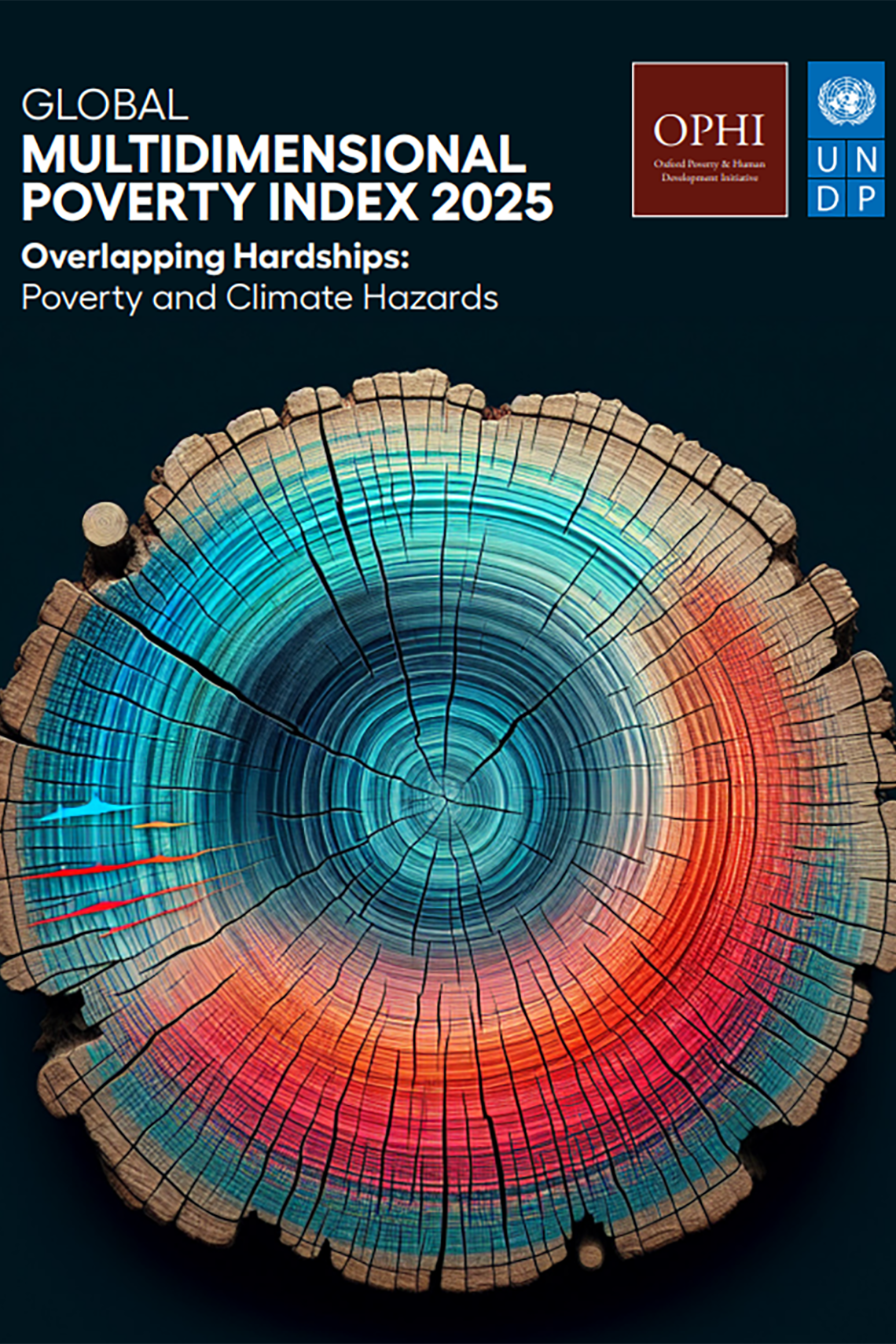Global Multidimensional Poverty Index 2025. Overlapping Hardships: Poverty and Climate Hazards
The Global Multidimensional Poverty Index 2025 is now available online, produced by the Oxford Poverty and Human Development Initiative (OPHI) and the Human Development Report Office of the United Nations Development Programme (UNDP). According to the report, nearly 80% of people living in multidimensional poverty – 887 million out of 1.1 billion globally – are exposed to climate hazards such as extreme heat, flooding, drought, or air pollution.
Released ahead of the COP30 climate summit in Brazil, the 2025 Global Multidimensional Poverty Index (MPI) report “Overlapping Hardships: Poverty and Climate Hazards” presents important new evidence on the experiences of multidimensionally poor people across 108 countries in relation to the climate crisis. The groundbreaking analysis overlays climate hazard data with global MPI data for the first time to reveal hotspots of where poverty and planetary pressures are both present.
“This report shows where the climate crisis and poverty are notably converging. Understanding where the planet is under greatest strain and where people face additional burdens created by climate challenges is essential to creating mutually reinforcing development strategies that put humanity at the centre of climate action,” said co-author, Sabina Alkire, Director of the Oxford Poverty and Human Development Initiative.
The report finds that an overwhelming 651 million multidimensionally poor people endure two or more climate hazards, while 309 million face three or four hazards simultaneously. It provides striking evidence on how the burden of concurrent climate hazards may weigh heavily on people already contending with multiple deprivations in their health, education and living standards as measured by the global MPI.
“Our new research shows that to address global poverty and create a more stable world for everyone, we must confront the climate risks endangering nearly 900 million poor people,” said Haoliang Xu, UNDP Acting Administrator. “When world leaders meet in Brazil for the Climate Conference, COP30, next month, their national climate pledges must revitalize the stagnating development progress that threatens to leave the world’s poorest people behind.”
Individually, the most widespread hazards affecting poor people globally are high heat (608 million) and air pollution (577 million). Flood-prone regions are home to 465 million poor people, while 207 million live in areas affected by drought.
The burden of exposure is distributed unevenly across regions and income groups. South Asia and Sub-Saharan Africa are identified as global hotspots for these compounded hardships, accounting for the largest numbers of poor people living in regions affected by climate hazards (380 million and 344 million respectively).
Across income groups, lower-middle-income countries bear the greatest burden of exposure of poor people to climate hazards, both in terms of absolute number and high proportion. About 548 million poor people in lower-middle-income countries are estimated to be exposed to at least one climate hazard, representing 61.8% of global poor people who are exposed to any climate hazard. Critically, over 470 million poor people in lower-middle-income countries confront two or more, concurrent climate hazards simultaneously.
In South Asia, the exposure is nearly universal; fully 99.1 percent of poor people in the region are exposed to one or more climate shocks (380 million people), with 91.6 percent (351 million) facing two or more, much higher than any other world region.
“The burdens identified are not limited to the present but are expected to intensify in the future,” said Pedro Conceição, Director of the Human Development Report Office, UNDP. Analysing temperature projection data, the report also finds that countries with higher current levels of multidimensional poverty are predicted to experience the greatest increases in temperatures by the end of this century.
The analysis of this report highlights the urgent need for global action to address the unequal burden of climate-related hazards on people living in multidimensional poverty. Confronting these overlapping risks requires moving from recognition to action, emphasizing the need for climate-resilient poverty reduction strategies, strengthened local capacities for adaptation, and scaled international redistribution and cooperative finance mechanisms.
Find out more
- Read the report
- Visit OPHI's Global MPI 2025 release page including data tables, technical files, documentation, country briefings, databank and media coverage.
- About the Global MPI
Watch the report launch on YouTube. An event summary will be forthcoming.

